Key takeaways:
- Organic wine is produced from grapes grown without synthetic fertilizers, pesticides, or herbicides, emphasizing ecological balance and sustainable practices.
- Health benefits stem from lower levels of synthetic additives in organic wines, promoting a safer consumption experience.
- The fermentation process utilizes wild yeasts, contributing to unique flavor profiles that reflect the vineyard’s terroir, unlike conventional wines.
- Choosing organic supports local farmers and promotes environmental sustainability, connecting consumers to the land and its wellbeing.
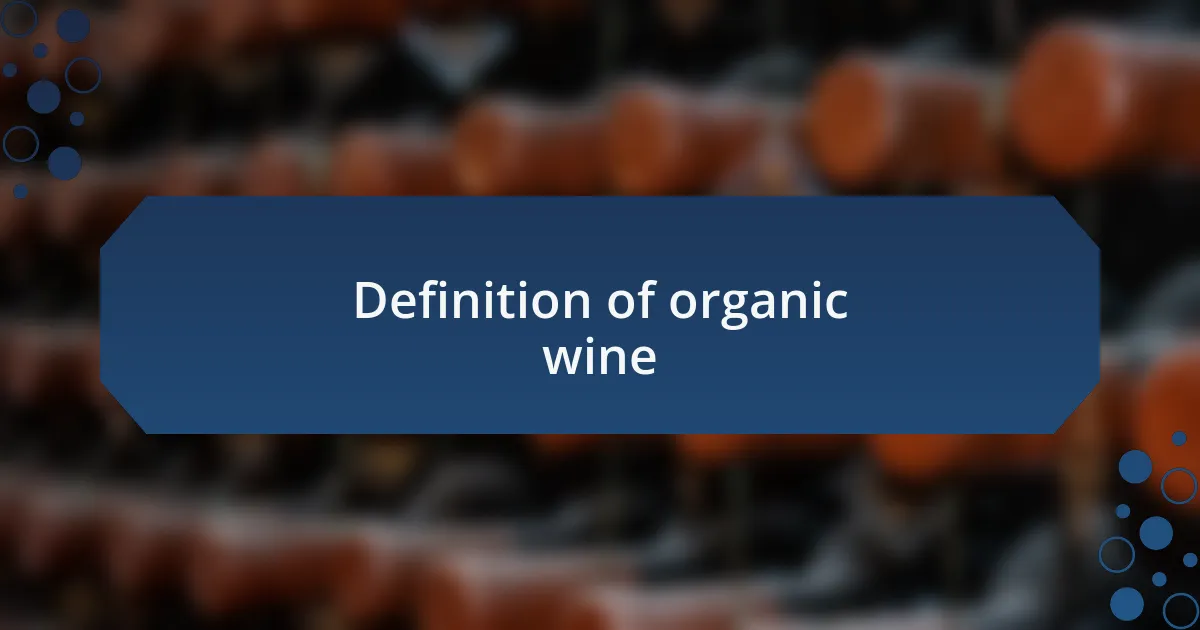
Definition of organic wine
Organic wine is essentially wine produced from grapes that are grown without synthetic fertilizers, pesticides, or herbicides. When I first discovered this concept, I was amazed at how much the choice of farming practices could influence not just the wine’s taste, but also its environmental impact. Isn’t it fascinating to think that what you’re sipping could come from a vineyard that prioritizes ecological balance?
Moreover, organic certification often means that winemakers also focus on sustainable vineyard management techniques, like crop rotation and composting. I recall visiting an organic vineyard where the owners shared their philosophy of nurturing the land—hearing their passion made me appreciate their wines on a whole new level. Can you imagine the difference in flavor when grapes are allowed to thrive in a natural setting?
In many regions, there are strict regulations governing what constitutes organic wine, including limits on the use of sulfur dioxide and other additives. This got me thinking: why would we want anything less in our glasses? It turns out that by choosing organic wine, we’re supporting quality and integrity in winemaking, which feels good both ethically and taste-wise.
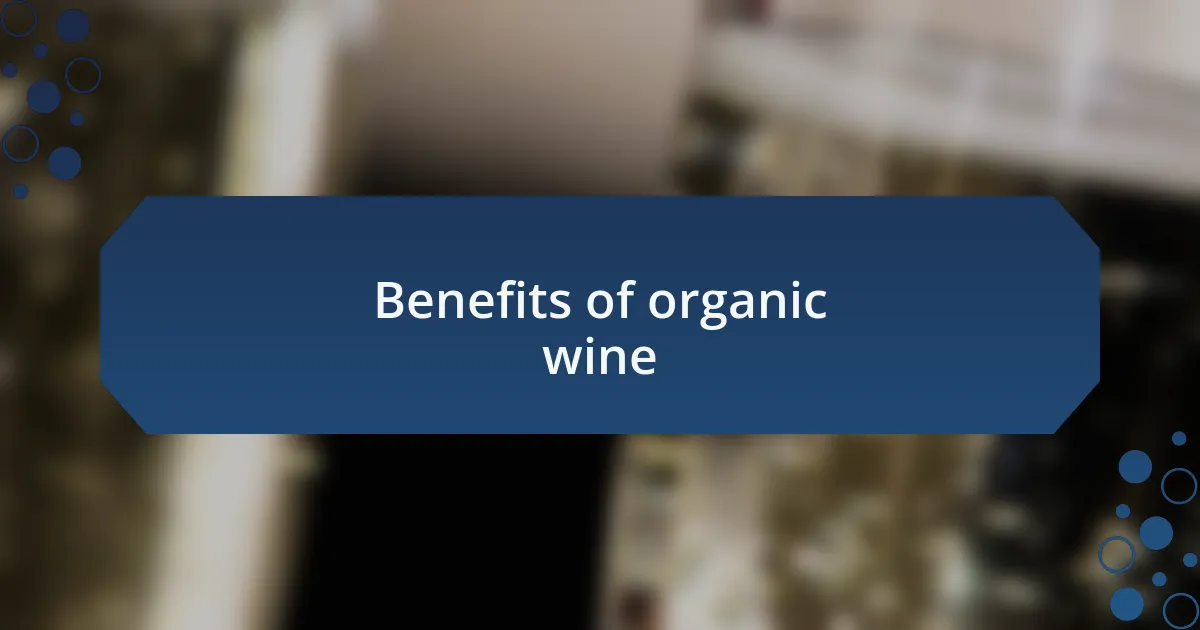
Benefits of organic wine
When I savor a glass of organic wine, it’s not just the taste that delights me. I often think about the health benefits that come along with it. Since organic wines are produced without synthetic additives, I feel more at ease knowing I’m consuming something that’s both delicious and less likely to contain harmful chemicals. Isn’t it nice to toast to good health?
Another benefit that stands out to me is the commitment to biodiversity in organic farming. I remember walking through an organic vineyard and noticing the vibrant ecosystem around it, with insects and wildflowers thriving among the grapevines. It struck me how these farms aren’t just about wine production; they actively foster a healthy environment. It made me ask myself: how often does my choice of wine contribute to the well-being of our planet?
Finally, the flavors of organic wines often speak for themselves, showcasing the unique character of the terroir. I’ve tasted organic reds that had a depth and complexity unlike anything else I’ve had before. Could it be that the grapes, grown holistically and sustainably, truly express their natural potential? I believe so, and it’s this connection to the earth that makes each sip a celebration of nature’s artistry.
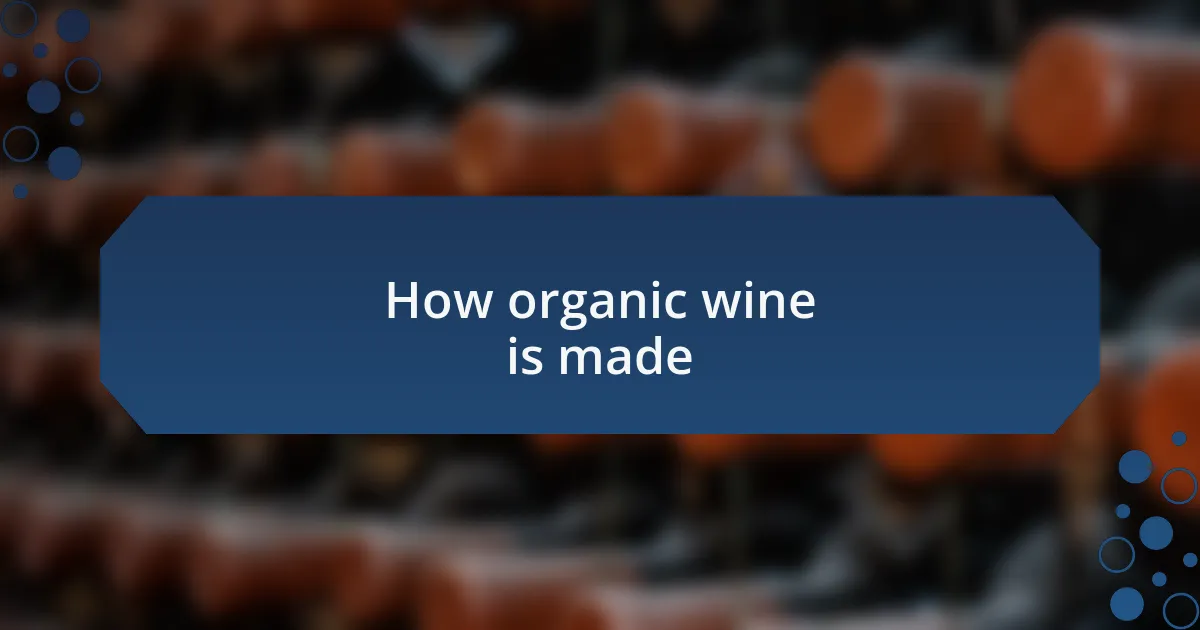
How organic wine is made
When it comes to making organic wine, the journey begins with the grapes themselves. I’ve seen firsthand how organic vineyards focus on cultivating fruits that are free from synthetic pesticides and fertilizers. Watching the careful selection of grape varieties that thrive in their natural environment always fascinates me. It raises the question: can the way grapes are grown truly impact the final flavor in the bottle?
Once the grapes are harvested, the fermentation process begins, but here’s where it significantly deviates from conventional methods. Organic winemakers often use wild yeasts for fermentation instead of commercial ones, which I find intriguing. This natural approach allows the wine to develop a unique flavor profile, bringing out the essence of the vineyard’s terroir. It’s like having a conversation with the land itself—don’t you think that adds a profound depth to each sip?
During my visits to organic wineries, I’ve also learned about the minimal intervention philosophy that guides the winemaking process. This means that organic wines are often made with fewer additives and preservatives. I’ve tasted the difference; there’s an authenticity to organic wine that’s hard to replicate. It begs the question: shouldn’t we all strive to drink wines that reflect their origins—not just in taste, but in how they are made?
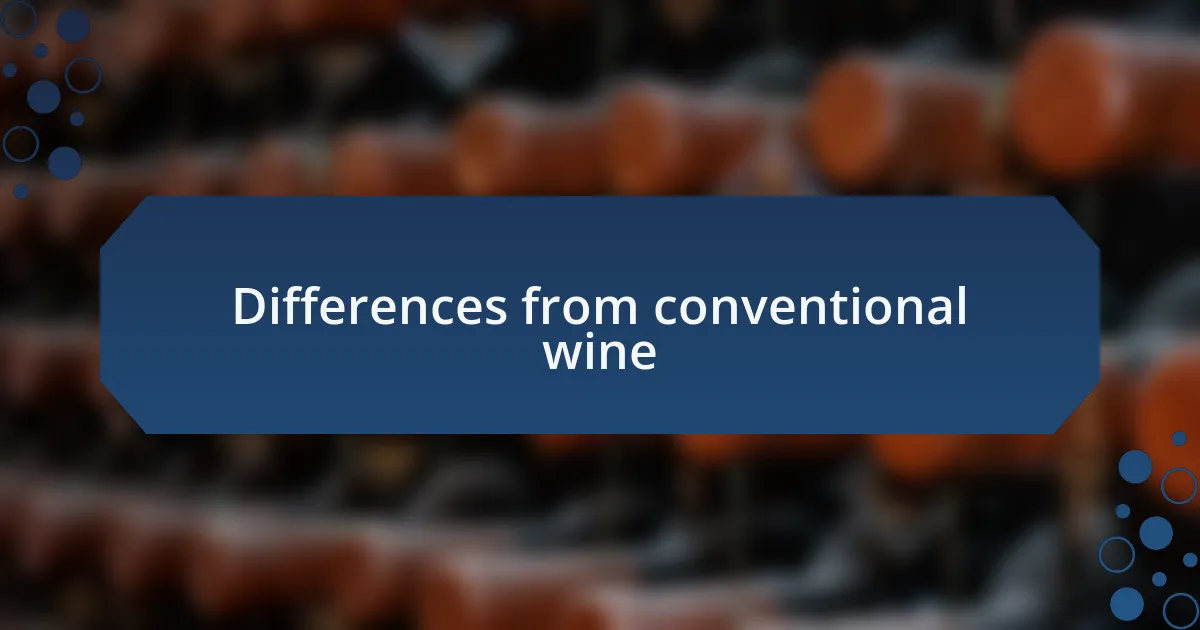
Differences from conventional wine
The most striking difference between organic and conventional wine is in the vineyards. I remember walking through an organic vineyard and noticing the vibrant ecosystem around me—wildflowers, insects, and healthy soil. In contrast, conventional vineyards often prioritize uniformity, using chemical treatments that can deplete this natural biodiversity. Isn’t it fascinating how the health of the land influences not just the grapes but the overall character of the wine?
Another key distinction lies in the fermentation process. I had the opportunity to attend a tasting where each organic wine revealed hints of its surrounding environment, thanks to the wild yeasts used by the winemakers. The layers of flavor felt like layers of history, while conventional wines, often made with commercial yeasts, tended to have a more predictable taste profile. Doesn’t it make you wonder how each bottle could tell a story if we paid closer attention to the methods behind its creation?
Lastly, the use of additives sets organic wine apart from conventional options. I fondly recall a winemaker sharing their philosophy over a glass of wine—less is more. It struck me that organic wines are crafted with an emphasis on purity, avoiding the heavy hand of sulfites and other chemicals commonly found in conventional wines. Isn’t it refreshing to think that some bottles emphasize authenticity over mass appeal?
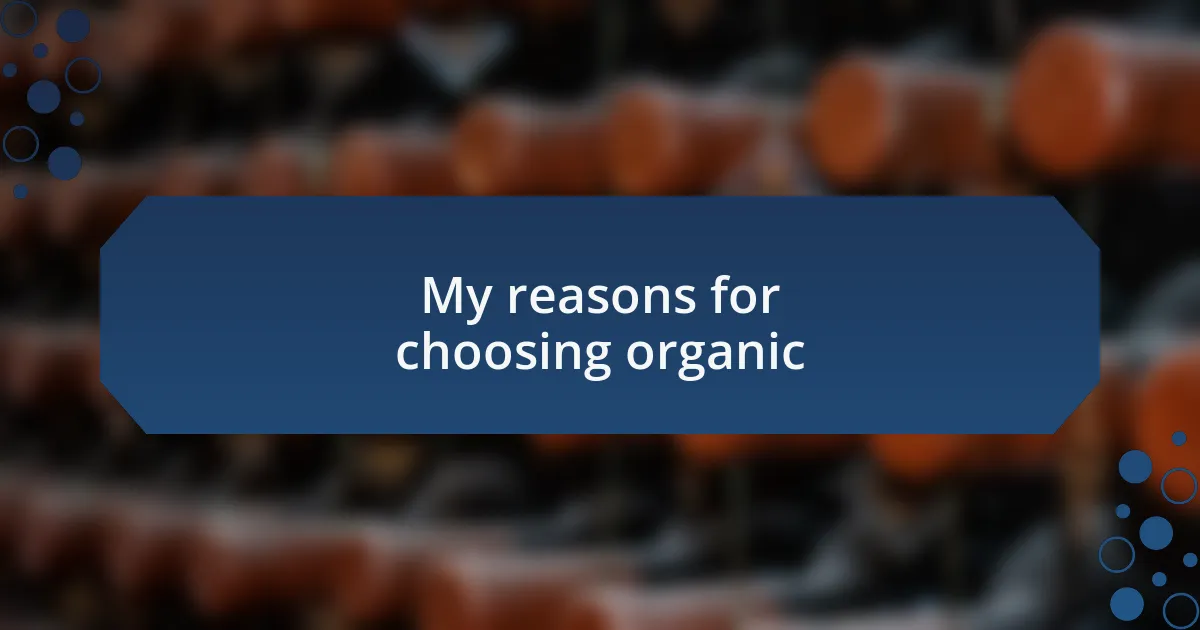
My reasons for choosing organic
Choosing organic wine is a decision shaped by my passion for sustainability and health. I vividly recall the first time I took a sip of organic wine, feeling a sense of connection not just to the grape but to the earth itself. Knowing that the vineyard practices promote ecological balance makes each glass feel more meaningful. Isn’t it incredible how our choices can align with our values?
Another driving reason is the impact on my health. I remember feeling relieved when I learned that organic wines have fewer additives and sulfites. Those small but significant changes made a noticeable difference in how I felt after enjoying a couple of glasses. Why settle for chemicals when we can savor wines that celebrate natural ingredients?
Moreover, supporting organic farmers feels right to me. I had the chance to meet a local winemaker who shared their commitment to organic practices. Listening to their journey inspired me; they were not just producing wine but nurturing the land for future generations. It leads me to think—when we choose organic, we aren’t just buying a product; we’re participating in a movement towards a healthier planet.
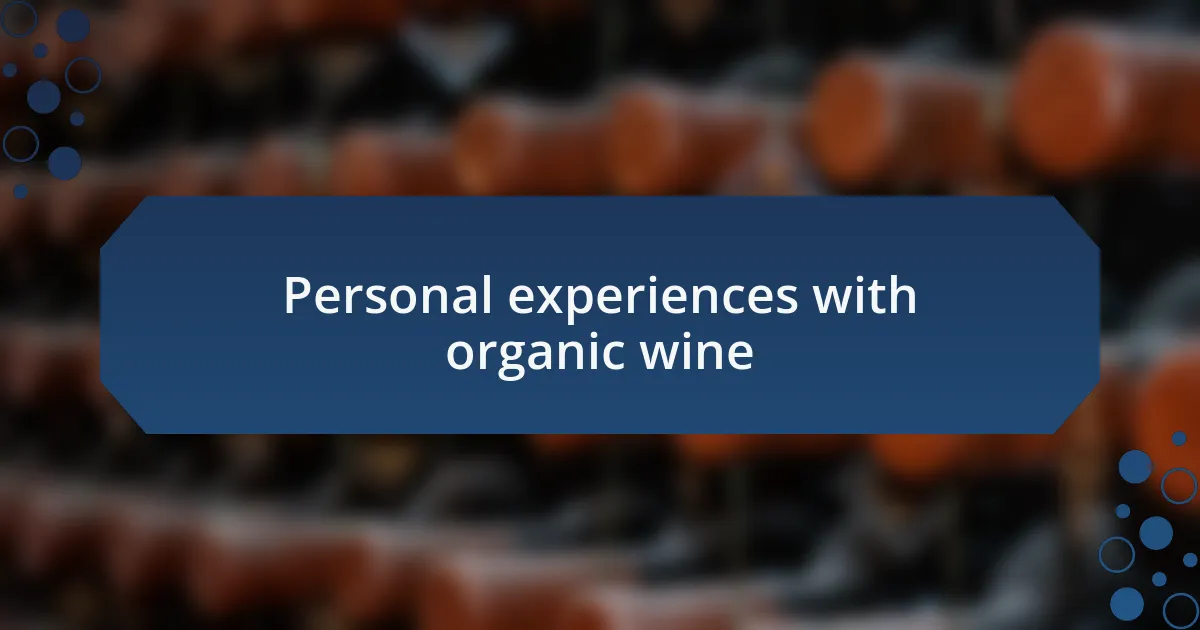
Personal experiences with organic wine
My first encounter with organic wine was at a quaint vineyard during a weekend getaway. As I swirled the glass, the rich aroma filled my senses, and I was struck by the freshness that seemed to leap from the glass. It reminded me of lazy summer afternoons spent in my grandmother’s garden—everything was vibrant and alive. In that moment, I realized organic wine transported me back to a simpler time, untainted by artificial flavors or processes.
There was a notable evening when I shared a bottle of organic red with close friends. As we savored each sip, the conversation flowed effortlessly, revealing the true essence of the wine. One friend remarked on its smooth finish, and I couldn’t help but share how it felt good to enjoy something that not only pleased our palates but also supported sustainable practices. It was an eye-opening experience that heightened my appreciation for food and drink that genuinely connects people and the planet.
Reflecting on my ongoing journey with organic wines, I often wonder how many other enthusiasts have had similar revelations. It feels like a shared secret among us who care about our choices. Each bottle tells a story, one that speaks to my values and ethical considerations. I’ve found that these wines often spark conversations about broader topics like environmental stewardship and health, making each tasting experience richer than the last. Isn’t it fascinating how a simple glass can help weave such connections?
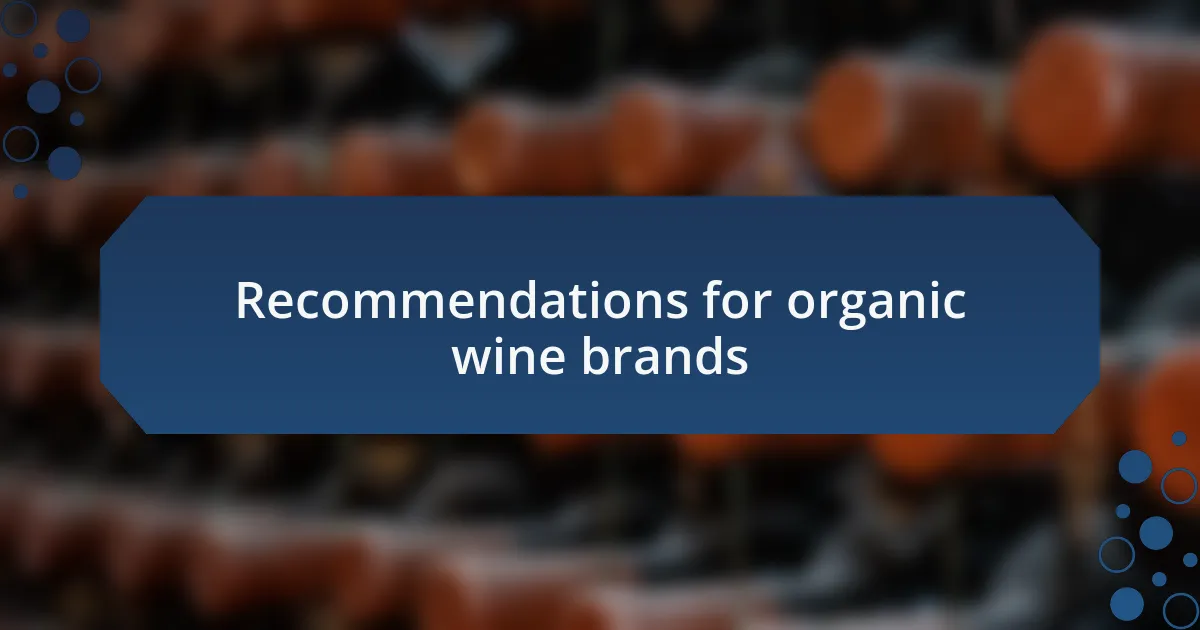
Recommendations for organic wine brands
When exploring organic wine brands, I always look for producers who prioritize sustainable practices and transparent sourcing. Recently, I stumbled upon a small winery in Mendocino, California, where the owners not only embrace organic farming but also engage in biodynamic practices. Their dedication to minimal intervention in the winemaking process truly resonated with me; it felt like drinking in harmony with nature itself.
I am a firm believer in trying out a variety of styles, so I recommend sampling both red and white wines from different regions. For instance, I once enjoyed a lush Cabernet Sauvignon that was velvety smooth, which contrasted beautifully with a crisp Sauvignon Blanc from New Zealand that had refreshing citrus notes. This experience reminded me of the versatility of organic wines and the unique expressions they offer, reflecting the terroir from which they come.
Don’t overlook the importance of supporting local producers as well. My favorite moments have come from visiting nearby vineyards, where I’ve had the pleasure of meeting passionate winemakers who share their stories and philosophies over a glass. By choosing to buy their organic wines, it feels like I’m helping cultivate community and sustainability—an experience that’s as enriching as the wine itself. What about you? Have you found that exploring local wineries has deepened your appreciation for organic offerings?